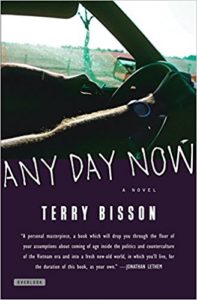For a good part of the way through Any Day Now, I was fairly certain that it would turn out to be the fourth perfect book, and even now I am not entirely sure that it is not. The book won’t be for everyone, though; I bounced off of the novel completely the first time I tried to read it.
If I had to say it was like anything else, which it isn’t, I would say it’s halfway between Ferrol Sams‘ three books about Porter Osborne, Jr. and The Armageddon Rag by George R.R. Martin. The story starts as a coming of age tale, with Clay, Bisson’s protagonist, as firmly located on Kentucky’s northern border as Osborne was in central Georgia. Clay is a generation younger than Osborne. Where Osborne fought in World War II, Clay is the son of a returned sailor, the last one off his sinking ship, forever marked by the experience.
(Clay grows up in the same town where Bisson did and eventually starts at a college in the Midwest not unlike Grinnell, which Bisson attended. Though Clay is a personal name rather than a family name, given that he is from Kentucky it was impossible for me not to think of Henry Clay and the other Clays who shaped both state and national history.)
Bisson tells the early part of the story in short snippets that are short on description, long on dialog, and that I found achingly beautiful. Bisson populates the small town with vivid people, capturing a Kentucky between eras, between north and south. Within 30 pages, Clay is in high school, and within 50 in college, but those formative years are as clear and memorable to a reader as they were to Clay. Some of the phrases coined then among friends echo through the years as they progress in their lives, leave town, fail to leave town, see each other again as time passes. Clay picks up a little bit of science fiction — a phrase from Arthur C. Clarke but as he starts to reach out toward a world beyond Owensboro it’s jazz and Beat writing that provide the rocket fuel for his launch.
With those interests and a stubborn streak that gets in the way of classwork, Clay is a natural for hitchhiking to New York, with nothing more than a guitar case that holds some clothes and some poems, and a college friend’s cousin as a contact. He’s a small-town kid in the big city, but a little luck and friends of the friend’s cousin help him to find a place not just to fit in, but to thrive.
Bisson suggests and sketches; he expects his readers to figure out what has happened in between the short pieces he uses to tell his story. They are seldom more than a page long, especially in the novel’s first half, but they do the job beautifully. Clay regularly receives letters from his mother, but Bisson only shows a short paragraph of each one. They give some news and prompt readers to think about what they don’t say.
About halfway through Any Day Now, Bisson slips his characters into an alternate history. At first, it’s bits of news from the outside world entering into the previously self-contained world of Clay and his friends and their doings. Michael Collins becomes the first person to walk on the moon in 1968; the Stonewall riot happens that year. One of the book’s hinges moves when LBJ resigns amid growing opposition to the Vietnam War. Martin Luther King Jr. survives the attempt on his life and gradually regains his health in Canada. Some of Clay’s friends venture deeper into opposition, and a sudden catastrophe puts him on the run.
Most of the rest of the book takes place where Clay finds refuge, among people setting up several different communes in southern Colorado, in the high country down by the border with New Mexico. Bisson shows the vision, the folly, the practical day-by-day work, and the tension with previous settlers. Without planning to, Clay has gone to an small town even smaller town than Owensboro. On the other hand, most of the people he interacts with share his interests. His practical skills and down-home background help him smooth some of the conflicts that arise in the West.
But not all of them. His previous life intersects dangerously with his new circumstances. These, too, skirt the law of the land as well as the tolerance of neighbors who are both armed and know the law is sometimes far away. If there is anything that keeps Any Day Now from being a perfect book, it’s in the way that Bisson portrays the larger alternative political developments. Nixon does not get elected in this other 1968, but Bisson sketches another kind of breakdown for that pivotal year. I don’t think that it works with the small-scale, realistic story that he is otherwise telling. But on the other hand, I am not sure that he intends the politics to feel real in the same way that he intends the characters to feel. Larger events do impinge on Clay and the people around him, but these larger events also seem distant and oddly accelerated. I’ll have to consider more about how these levels fit together before I am really sure what I think about Any Day Now.
I do know that I read it all in a day, that it’s beautiful, that its characters will stay with me, and that it made me think. Maybe it isn’t the fourth perfect book, but it’s awfully close.

